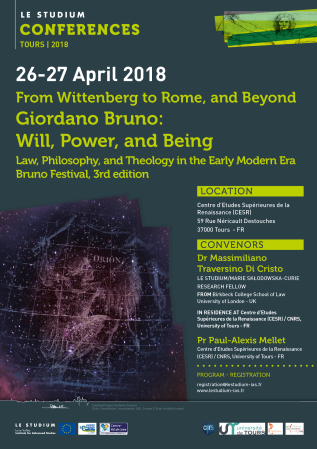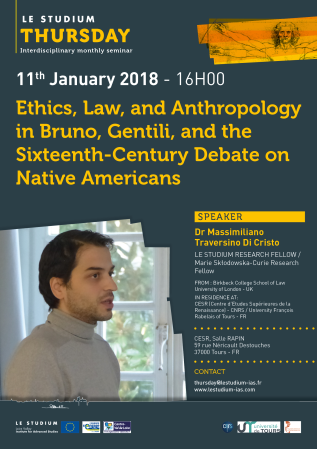Dr Massimiliano Traversino Di Cristo

Établissement d'origine
Birkbeck College School of Law University of London - UK
Laboratoire d'accueil
Centre d’Études Supérieures de la Renaissance(CESR) / CNRS, Université de Tours - FR
Hôte Scientifique
Dr Paul-Alexis Mellet
PROJET
Volonté, puissance, être : la conception de la puissance au XVIe siècle et ses modèles anciens et médiévaux
En arrêtant notre attention sur le conception moderne de la puissance, nous n’entendons affirmer simplement son importance dans l’histoire des idées occidentales. Nous nous proposons d’en déterminer plutôt la portée de l'antiquité classique et de la scolastique médiévale pour l’évolution de la tradition juridique au début de l’époque Moderne. À partir de la distinction scolastique entre deux modalités d’expression du pouvoir divin (potentia Dei absoluta et ordinata) et de la question de la toute-puissance divine, nous examinerons ici la diversité des formes et des significations de la conception de la puissance dans le temps.
Recouvrant un arc temporel qui va de Pierre Damien et Anselme d’Aoste à Giordano Bruno et Alberico Gentili, nous entendons indiquer non seulement les limites de cette évolution mais aussi la direction thématique de notre traité. Si, à ses débuts, la conception de la puissance faisait partie de l’enquête par les auteurs médiévaux sur les attributs divins et sur la toute-puissance divine, un lent processus ininterrompu d’élaboration conceptuelle en a bien vite permis l’adoption dans le domaine du droit. En partant de la théologie médiévale, les juristes de droit commun en ont adapté la terminologie et créé une série de concepts nouveaux capables de définir l’extension et les limites du pouvoir pontifical et des autorités séculières, effort qui aurait donné naissance, au XVIe siècle, au même modèle juridique et politique dont relèvent les concepts de prince et de souveraineté.
Au XVIe siècle, nous pouvons en fait retrouver, d’un côté, dans la reformulation normée de la puissance divine le moment généalogique de la réflexion moderne sur la souveraineté et l’absolutisme et établir, de l’autre, et toujours à l’intérieur de cette question, le point central pour une compréhension de la structure caractérisant la tradition juridique européenne.
Séminaire organisé par ce chercheur
- avec la collaboration du Dr Paul-Alexis Mellet : Machiavélisme et anti-machiavélisme dans la pensée juridique et politique du XVIe siècle
Publications in relation with the research project
Publications
In more general terms, many mediaeval authors-and not only theologians used the distinction between God's ordered and absolute power (potentia Dei absoluta and ordinata) to emphasize how, on the one hand, in an 'orderly' way, the realm of nature reflects God's freedom of choice, leading to the existence of a radically contingent order of creation; but also how, on the other hand, in terms of divine absoluteness and in the economy of salvation, God is never bound in his action, which is truly inscrutable and lies above morality. 1 The extensive scholarship on this distinction clearly demonstrates how such a question represented a real 'problem' for mediaeval thinkers rather than just a simple theory. 2 I am limited to mentioning here that the doctrine of God's power comes to the fore with a much different significance in various historical epochs.
Il principio della giustificazione per sola fede costituisce il cuoredella teologia di Lutero. Siffatto principio rappresenta a tutt’oggi il principale elemento di distinzione dottrinaria tra mondo cattolico emondo evangelico e sul superamento di tale distinzione si giocano lesorti delle iniziative ecumeniche promosse negli ultimi decenni. Restando a Lutero, l’accento da lui posto sulla fede ha avuto per con-seguenza di creare nell’immaginario collettivo l’impressione che eglifaccia a meno delle opere. Questo luogo comune trascura in realtà il ruolo etico che il riformatore assegna alle opere. Se è nella centralitàattribuita alla fede che va riconosciuto il maggiore elemento di novitàofferto da Lutero alla storia della civiltà occidentale a lui successiva, per una corretta comprensione del messaggio del riformatore le opererappresentano un elemento irrinunciabile. Il presente testo si proponedi chiarire tale affermazione alla luce di alcuni testi di Lutero, pren-dendo in esame un punto fondamentale dell’etica luterana: la confor-mità delle buone azioni dell’uomo alla volontà di Dio.
Il presente saggio si propone di esaminare le vicende processuali di Maestro Eckhart alla luce dell’agenda, insieme spirituale e politica, del pontificato di Giovanni XXII. Speciale attenzione è rivolta al ruolo rivestito nel caso di Eckhart da Enrico II di Virneburg, arcivescovo di Colonia e potente alleato sia di Giovanni XXII che di Federico d’Austria – il rivale, sostenuto dal papa, di Ludovico IV di Baviera al trono imperiale.
Among the most debated questions of today's historiography, comparison is increasingly relevant. This is mainly due to the impact it has on fields of study as different as anthropology, law, religion, history, etc., and the extremely variegated articulation to which it gives rise between them. In my paper, I will concentrate on the ambit of normative history and consider the case of Alberico Gentili (†1608). With respect to Gentili, comparison helps us trace the role of theology and religious ideas in early-modern legal debates on prince and sovereignty. Special attention will be given to the distinction between God’s absolute and ordered power (potentia Dei absoluta and ordinata) and to Gentili’s image of Luther.
Final reports
Throughout the 20th century, an impressive amount of scholarship was devoted to the origin of the concepts of the prince and sovereignty. By focusing on the ancient and mediaeval sources of 16th-century authors, I tried to determine the degree to which the modern fate of the notion of power depended on ancient and mediaeval debates. I paid special attention to the ethical, anthropological, and legal questions implied in the European encounter with the ‘New World’. Despite its broad relevance to studies on early modern era, this subject has often been disregarded with respect to the history of the concept of power. My analysis helped me trace this subject within the most central debates of the last decades of the 16th century. Through the authors of this time, I showed the interrelation between the discussion on Native Americans and a variety of sources of modern history of ideas, which span early-modern philosophy, cosmology, theology, and public and international law.


